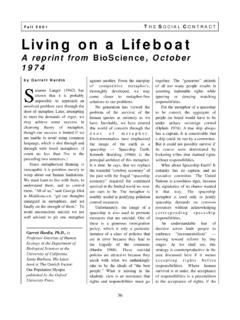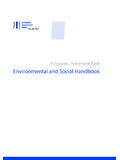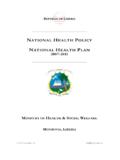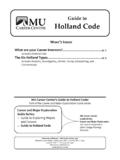Transcription of Fall 2001 T S C The Tragedy of the Commons - Garrett Hardin
1 Fall 2001 THE social CONTRACT 26 Garrett Hardin , isProfessor Emeritus of HumanEcology in the Department ofBiological Sciences at theUniversity of California,Santa Barbara. The Tragedyof the Commons wasoriginally given as an addressto the Pacific Division of theAmerican Association for theAdvancement of Science, iscopyrighted by the AAAS, andis reprinted with theirpermission from Science, 13 December 1968, vol. 162, Tragedyof the Commonsby Garrett HardinAt the end of a thoughtfularticle on the future ofnuclear war, Wiesner andYork1 concluded that: Both sidesin the arms race the dilemma of steadilyincreasing military power andsteadily decreasing nationalsecurity. It is our consideredprofessional judgment that thisdilemma has no technicalsolution. If the great powerscontinue to look for solutions in thearea of science and technologyonly, the result will be to worsen thesituation.
2 I would like to focus yourattention not on the subject of thearticle (national security in anuclear world) but on the kind ofconclusion they reached, namelythat there is no technical solution tothe problem. An implicit and almostuniversal assumption of discussionspublished in professional and semi-popular scientific journals is that theproblem under discussion has atechnical solution. A technicalsolution may be defined as one thatrequires a change only in thetechniques of the natural sciences,demanding little or nothing in theway of change in human values orideas of morality. In our day (though not in earliertimes) technical solutions arealways welcome. Because ofprevious failures in prophecy, ittakes courage to assert that adesired technical solution is notpossible.
3 Wiesner and Yorkexhibited this courage; publishing ina science journal, they insisted thatthe solution to the problem was notto be found in the natural cautiously qualified theirstatement with the phrase, It is ourconsidered Whether they wereright or not is not the concern of thepresent article. Rather, the concernhere is with the important conceptof a class of human problems whichcan be called no technical solutionproblems and, more specifically,with the identification anddiscussion of one of is easy to show that the classis not a null class. Recall the gameof tick-tack-toe. Consider theproblem, How can I win the gameof tick-tack-toe? It is well knownthat I cannot, if I assume (inkeeping with the conventions ofgame theory) that my opponentunderstands the game another way, there is no technical solution to the can win only by giving radicalmeaning to the word win.
4 I canhit my opponent over the head; or Ican drug him; or I can falsify therecords. Every way in which I win involves, in some sense, anabandonment of the game, as weintuitively understand it. (I can also,of course, openly abandon the game refuse to play it. This is whatmost adults do.)The class of No technicalsolution problems has thesis is that the populationproblem, as conventionallyconceived, is a member of thisclass. How it is conventionallyconceived needs some comment. Itis fair to say that most people whoanguish over the population problemare trying to find a way to avoid theevils of over-population withoutrelinquishing any of the privilegesthey now enjoy. They think thatfarming the seas or developing newstrains of wheat will solve theproblem technologically.
5 I try toshow here that the solution theyseek cannot be found. Thepopulation problem cannot besolved in a technical way, any more Fall 2001 THE social CONTRACT 27 The optimumpopulation is, then,less than themaximum. Thedifficulty of definingthe optimum isenormous; so far asI know, no one hasseriously tackledthis problem. than can the problem of winning thegame of Shall WeMaximize?Population, as Malthus said,naturally tends to grow geometrically or, as we wouldnow say, exponentially. In a finiteworld this means that the per capitashare of the world s goods muststeadily decrease. Is ours a finiteworld?A fair defense can be putforward for the view that the worldis infinite; or that we do not knowthat it is not. But, in terms of thepractical problems that we mustface in the next few generationswith the foreseeable technology, itis clear that we will greatly increasehuman misery if we do not, duringthe immediate future, assume thatthe world available to the terrestrialhuman population is finite.
6 Space is no finite world can support onlya finite population; therefore,population growth must eventuallyequal zero. (The case of perpetualwide fluctuations above and belowzero is a trivial variant that need notbe discussed.) When this conditionis met, what will be the situation ofmankind? Specifically, canBentham s goal of the greatestgood for the greatest number berealized?No for two reasons, eachsufficient by itself. The first is atheoretical one. It is notmathematically possible tomaximize for two (or more)variables at the same time. Thiswas clearly stated by von Neumannand Morgenstern,3 but the principleis implicit in the theory of partialdifferential equations, dating back atleast to D Alembert (1717-1783).The second reason springsdirectly from biological facts.
7 Tolive, any organism must have asource of energy (for example,food). This energy is utilized fortwo purposes: mere maintenanceand work. For man, maintenance oflife requires about 1,600 kilo-calories a day ( maintenancecalories ). Anything that he doesover and above merely stayingalive will be defined as work, andis supported by work calories which he takes in. Work caloriesare used not only for what we callwork in common speech; they arealso required for all forms ofenjoyment, from swimming andautomobile racing to playing musicand writing poetry. If our goal is tomaximize population it is obviouswhat we must do: We must makethe work calories per personapproach as close to zero aspossible. No gourmet meals, novacations, no sports, no music, noliterature, no art.
8 I think thateveryone will grant, withoutargument or proof, that maximizingpopulation does not maximizegoods. Bentham s goal reaching this conclusion Ihave made the usual assumptionthat it is the acquisition of energythat is the problem. The appearanceof atomic energy has led some toquestion this assumption. However,given an infinite source of energy,population growth still produces aninescapable problem. The problemof the acquisition of energy isreplaced by the problem of itsdissipation, as J. H. Fremlin has sowittily The arithmetic signsin analysis are, as it were, reversed;but Bentham s goal is optimum population is, then,less than the maximum. Thedifficulty of defining the optimum isenormous; so far as I know, no onehas seriously tackled this an acceptable and stablesolution will surely require morethan one generation of hardanalytical work and want the maximum good perperson; but what is good?
9 To oneperson it is wilderness, to another itis ski lodges for thousands. To oneit is estuaries to nourish ducks forhunters to shoot; to another it isfactory land. Comparing one goodwith another is, we usually say,impossible because goods cannot becompared. Fall 2001 THE social CONTRACT 28 ..by anyreasonablestandards, themost rapidlygrowingpopulations onearth today are (ingeneral) the mostmiserable. Theoretically this may be true;but in real life incommensurablesare commensurable. Only acriterion of judgment and a systemof weighting are needed. In naturethe criterion is survival. Is it betterfor a species to be small andhideable, or large and powerful?Natural selection commensuratesthe incommensurables. Thecompromise achieved depends on anatural weighting of the values ofthe must imitate this is no doubt that in fact healready does, but unconsciously.
10 Itis when the hidden decisions aremade explicit that the argumentsbegin. The problem for the yearsahead is to work out an acceptabletheory of weighting. Synergisticeffects, nonlinear variation, anddifficulties in discounting the futuremake the intellectual problemdifficult, but not (in principle) any cultural group solvedthis practical problem at the presenttime, even on an intuitive level?One simple fact proves that nonehas: There is no prosperouspopulation in the world today thathas, and has had for some time, agrowth rate of zero. Any peoplethat has intuitively identified itsoptimum point will soon reach it,after which its growth ratebecomes and remains course, a positive growthrate might be taken as evidencethat a population is below itsoptimum.







